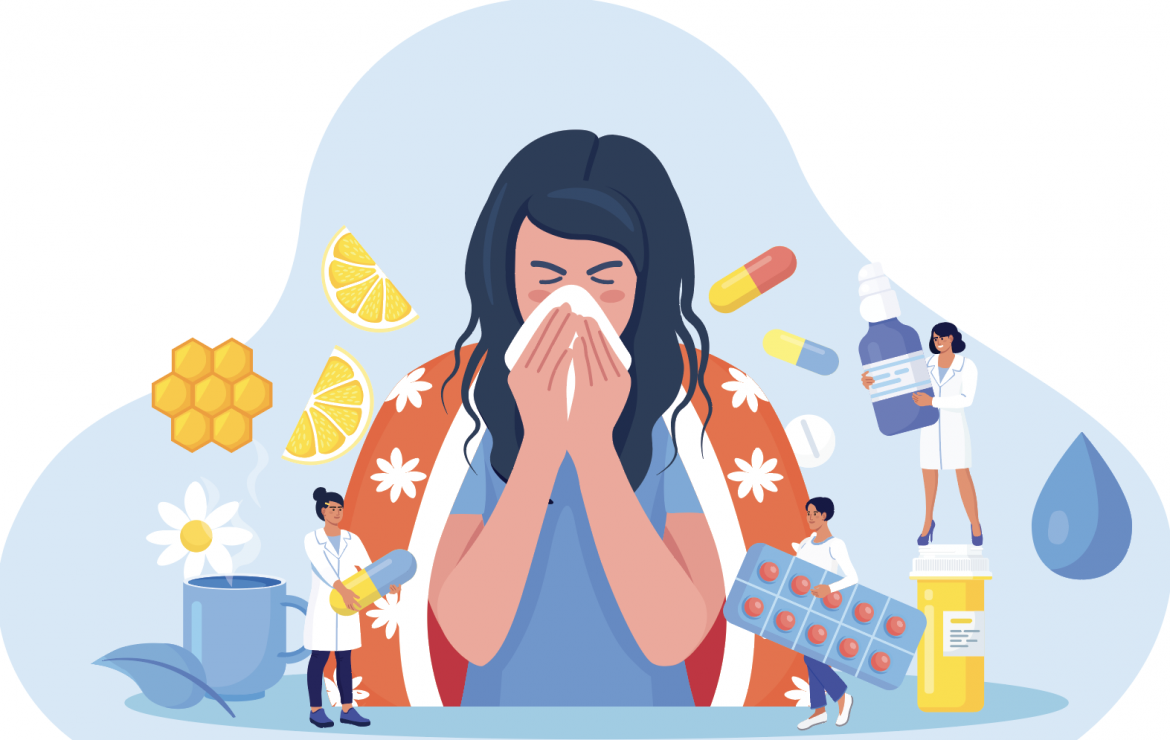Seasonal flu is a rapidly spreading acute viral infection affecting every age group.
Caused by an influenza virus, seasonal flu mainly affects the respiratory system, particularly the nose, pharynx, and lungs.
Infections range from mild to severe, and may sometimes lead to death when affecting groups characterized by high-risk factors.

Infection
Seasonal flu is an infectious disease that spreads rapidly in crowded places through the inhalation of droplets dispersed in the air by an infected person coughing, sneezing, or talking.
Droplets can infect you through direct inhalation or touching contaminated surfaces before touching your eyes, mouth, and nose.
Incubation
On average, the incubation period ranges from 2-4 days, and people infected with the virus are likely to become contagious when the symptoms appear or a day before.
The incubation period lasts about 5 -7 days after symptoms appear and even longer in children and people with compromised immunity
Flu viruses
Flu viruses are characterized by undergoing multiple mutations which change the shape of the virus and regularly form new strains with the ability to elude the human immune system.
To keep up with these mutations, which usually occur annually, seasonal influenza vaccines change annually to match the spreading strains every winter, thus last year’s vaccine doesn’t counter this year’s strains.
For example, if you’ve had the flu in the past, your body has already made antibodies to fight that particular strain, and when you are exposed to a similar strain later, these antibodies work to prevent the infection or lessen its severity.
However, these antibodies cannot protect you from new strains, which have a very different immunological shape.
Risk Factors
Seasonal flu affects everyone and the following groups are most at risk of developing complications:
Children under the age of 5 years.
Adults over the age of 65 years.
Pregnant women (at any stage of pregnancy).
Health care workers.
People suffering from chronic lung diseases, heart diseases, diabetes as well as kidney and liver diseases.
People with a compromised immune system such as cancer patients.
Symptoms
Sudden fever of more than 38 degrees Celsius
Chills and sweating
Headache and nausea
Coughing (usually dry)
Fatigue and exhaustion
Runny or stuffy nose
Sore throat
Muscles and joints pain
Vomiting or diarrhea particularly in children.
Possible Complications
Most flu patients recover within a few days to two weeks without treatment, requiring only rest and drinking plenty of fluids, however, if the symptoms increase and persist especially in patients at risk of complications, a doctor may prescribe antiviral drugs to help minimize the duration and the complications of the infection.
The most vulnerable groups consist of children, the elderly, and people suffering from chronic diseases, as some cases can develop infections in the lungs, bronchial tubes, ears, or sinuses.
In some cases with people suffering from chronic diseases, general health may deteriorate, threatening the lives of the patients and leading to death.
Prevention
1. Vaccination
Seasonal vaccination offers the best protection against the flu and its serious complications, as it is considered the most successful and effective preventative method.
The seasonal flu vaccine boasts a bright record of safety and efficacy with a high rate of success in preventing disease in healthy adults when the circulating viruses are similar to the viruses contained in the vaccines, and it can also contribute to reducing complications or death from the disease.
After the person takes the vaccine, his immune system produces antibodies to the virus in a process that takes about two weeks, after which the body acquires the ability to defend against the seasonal flu virus.
It is highly recommended that you take the seasonal flu vaccine if possible, ideally before the winter (between September and October), however, it is possible to take the vaccine at any time throughout the winter until March as long as flu viruses are spreading.
The World Health Organization (WHO) and the Centers for Disease Control and Prevention (CDC) recommend getting the seasonal flu vaccine once a year from the age of 6 months and above, and focusing on vaccinating those most at risk.
2. Other preventive measures to prevent infection
• Cover your nose and mouth when coughing or sneezing with a tissue and dispose of it immediately.
• Clean and sterilize surfaces regularly to reduce the possibility of infection.
• Avoid touching your eyes or mouth immediately after touching surfaces.
• Wash and sterilize your hands frequently.
• Limit your interactions with others when infected with the flu to reduce the risk of transmitting the disease.
• Avoid direct contact and sharing items with the infected person.
• Avoid crowded places.
By: Dr. Badreyya Al-Harmi, Consultant Public Health, Vice President of the Emirates Public Health Association













